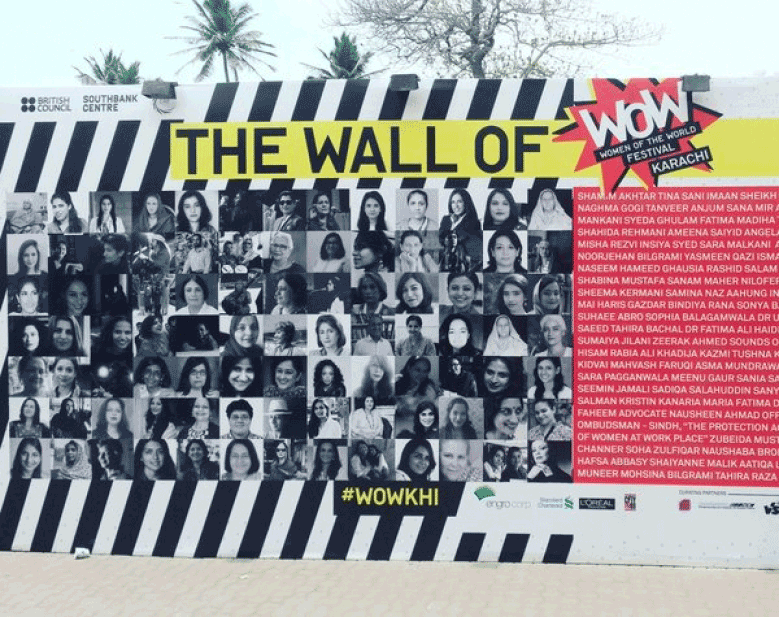WOW Festival Karachi
By Deneb Sumbul | Newsliners | Published 9 years ago
On May 1 this year, Karachi had the distinction of being the first South Asian city to host the Women of the World (WOW) festival, celebrating women. Held at the Beach Luxury Hotel with the support of The British Council and London’s Southbank Centre, the one-day event with free entry, was attended by women from all walks of life and all parts of Karachi. They participated in the discussions on the problems faced by women and shared their own stories of inspiration. The central focus of the sessions was gender equality and justice.
The WOW festival was launched in 2011 in London’s Southbank Centre by its artistic director, Jude Kelly, on the centenary of International Women’s Day. Since its inception, it has grown into one of the largest women’s festival network in the world, and held 15 festivals around the globe attended by over a million people.
Several curating partners conducted panel discussions, workshops and performances, running five to six sessions simultaneously. Among the themes that were touched upon were `Bringing up girls, it takes a village,’ `Feminism today,’ `Women’s rights at the workplace,’ ‘Women surviving vulnerability’ and ‘Conflict in the city: Karachi as a woman.’ There were some extremely useful workshops on `How to become an effective volunteer’ and `How to start business in under Rs. 100,000.’ For the very young participants, there was the ‘Under 10’s Feminist Corner.’
In the opening session,`Best of Times, Worst of Times: A Year in Review’ moderated by Jim Booth of the British Council, WOW founder Jude Kelly, who had flown down for the inaugural, spoke about the lacunae in the laws pertaining to women, across the world. In her view, until there was a strong representation of women in the power structure, there was little hope for women-centric laws. “Mostly men are very nervous about giving power to women and find it hard to imagine why it is needed at all,” says Kelly, “They lack imagination and empathy. That is why it’s important that women raise their voices on legal issues. When women come to power, they are told not to speak on women’s issues. Often they become isolated when they achieve power.”
Islamabad-based social activist, Tahira Abdullah said that Pakistan boasted sound constitutional provisions on gender equality and gender justice. Over the last 10 years, 10 different laws had been introduced to address issues of sexual harassment at the workplace, `honour’ killings, rape and traditional harmful practices against women. However, there was a total lack of commitment and political will to implement them.
Nimco Ali, a British social activist of Somali origin, said social change required a conversation or a dialogue, especially with those in power. Referring to Sharmeen Obaid-Chinoy’s Oscar award-winning documentary, A Girl in the River, she said she found it interesting that there was legislation in Pakistan to combat women’s issues but nobody seemed to be aware of it. Legislation without conversation amounted to little more than pretty words on paper, and that’s why the WOW platform was important — it took issues directly to the public.
I. A. Rehman, General Secretary of the Human Rights Commission of Pakistan, spoke of the dismal condition of women in the industrial and agricultural sectors and pointed out to the dangers women’s rights activists who are trying to ameliorate the conditions of the women workers, face. In the context of elections, he revealed that even now, in many places women lacked the freedom to exercise their right to vote and despite the increased representation of women in parliament, the male MNAs kept them at arm’s length.
On the positive side, there were several truly inspirational success stories that were shared in the two sessions of `WOW Bites,’ in which 10 women speakers revealed their life stories. Among them were Sana Mir, the outgoing captain of the Pakistan women’s cricket team, and Syeda Ghulam Fatima, the award-winning social activist from Lahore who fights for the rights of brick kiln workers.
The event concluded late evening with a concert featuring the very dynamic Nescafe Basement All-Girls Band, followed by Sounds of Kolachi.
The writer is working with the Newsline as Assistant Editor, she is a documentary filmmaker and activist.



